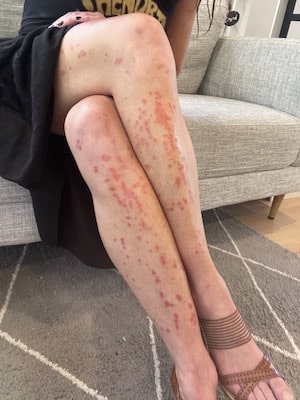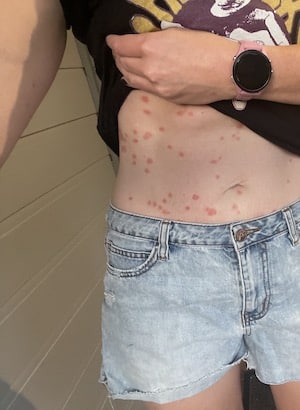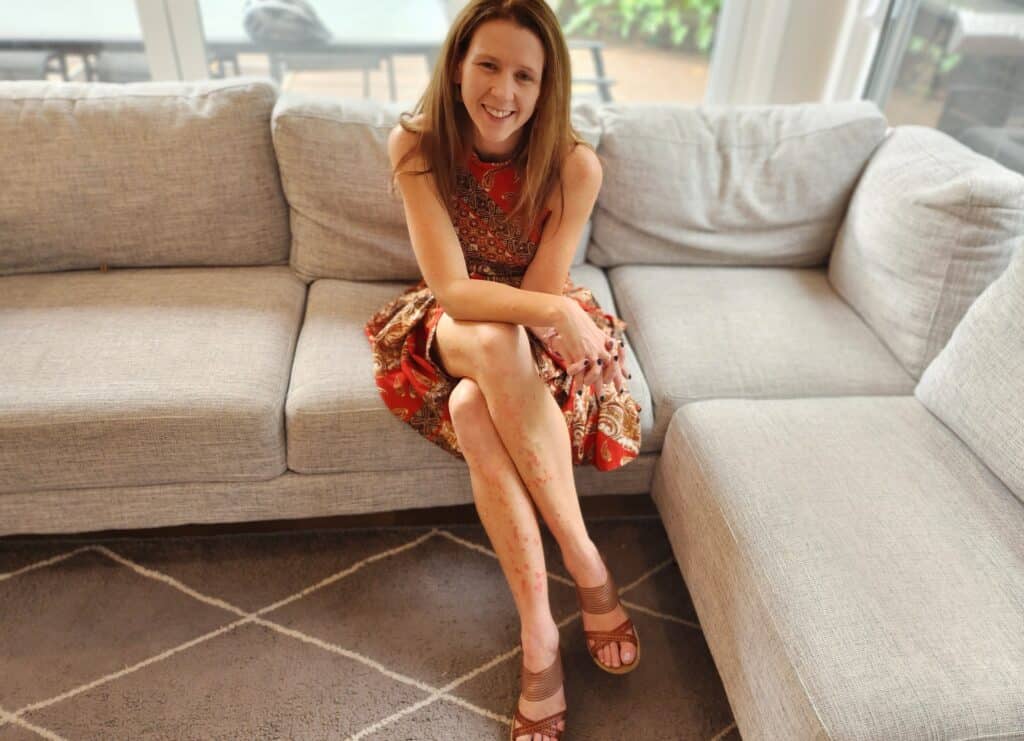I’ve been asked on more than one occasion if I’m contagious.
It’s happened on a bus, during a client meeting, and in a gym change room.
Those asking do so after seeing parts of my skin exposed during particularly bad psoriasis flare-ups. I’m sure their question comes from a place of personal panic or some public sense of duty to protect others.
They jump to concerns about catching something because we’ve all been socialised to have visceral reactions to skin imperfections, particularly rashes. Seeing a rash sparks an urge to assess and diagnose and seek assurances that what we’ve witnessed within our personal proximity is nothing we need to worry about personally.
But those who live with chronic forms of such rashes and skin conditions experience something else when these questions, stares and reactions come up: a deep sense of shame.
It’s the shame of exposing too much leg and making others uncomfortable, or the shame of removing a jumper or jacket while in transit on a hot day and before you were able to make it back behind closed doors.
And there is little to no talk of “body positivity” when it involves showing skin that carries unsightly and unexpected rash-like imperfections.
I’m one of around 1.6 million Australians who live with psoriasis, an immune-mediated disease that presents as white and red scaly patches across the skin “due to systemic inflammation”. There is no cure, but treatments have been getting significantly better over the years. I’m lucky that much of the time psoriasis may only impact five per cent of my body, and often in easily disguised areas. I’ve even had entire years of clear skin. Occasionally, this autoimmune disease flares into something much more serious, moving across my stomach, back and onto all four limbs. This kind of flare-up can come on quickly and last for six months or so, limiting my ability to exercise and stay active, impacting my sleep, and my overall mental health.
There are several comorbidities that those with psoriasis experience, ranging from heart disease to diabetes and psoriatic arthritis affecting the joints. But one of the most significant comorbidities is depression, with research showing those with psoriasis have a higher rate of suicide than those without.
Psoriasis can be painful, uncomfortable and distressing. It can feel like your skin is burning and then feel like nothing at all. It can be unpredictable, granting you months of relief and clear skin before gripping you again suddenly, invading a little more of your body each day. It can be exacerbated by certain foods, alcohol and especially stress.
Unfortunately, these exacerbating factors can lead to a perpetual cycle of stress and anxiety, as well as toxic feelings of guilt as you see or perceive your skin to look worse after eating, drinking or doing something you believe is contributing to it.
But much of the mental-related distress can also come from reactions from other people, or our perceptions of what other people think. The distress also comes back to beauty standards and ideals, and the fact we don’t see rashes in photos shared on social media – especially when one of the easiest things to “fix” about yourself comes via Instagram filters that can wash over the wrinkles, freckles, pimples, scars, birthmarks and rashes that are visible on your skin.

Despite the world’s most influential social media star sharing her psoriasis diagnosis, there isn’t a huge trend of people proudly sharing their red, scaly patches. While I’m grateful my job doesn’t require cameras and people inspecting every part of my appearance, I’m also mindful of the tools Kim Kardashian has to help manage and cover it.
The images you do see of psoriasis on social media are largely associated with searches for answers, or they are used to promote an industry of promises to a vulnerable segment that is desperate for answers.
I was surprised to learn it was World Psoriasis Day just a few weeks ago. I’d never heard of it, despite experiencing four months now of my worst flare-ups in years and despite being first diagnosed when I was four years old.
Running a search on LinkedIn to see where and who is talking about it, especially in a workplace context, brings up few Australian posts and comments from those living with it. And most of the images I found were being reshared by dermatologists to show and boast about their patients’ “results”.
I also rarely see people with large and visible signs of psoriasis during day-to-day activities, at least nothing close to the proportion of Australians who live with it. This leads me to believe that most, like myself, dress to cover it up when and where it’s triggered, or even opt out of events and in-person experiences during their worst flare ups, to avoid the personal discomfort and the discomfort and concerns of others.
No topical treatment has ever done much for me, but I’m lucky that I respond well to phototherapy, a form of controlled UV light treatment, a course of which involves going to a clinic or hospital where facilities are available. But I’m well aware of my privilege in having access to this. Attending this treatment three times a week for six to eight weeks requires proximity to such facilities, transport, workplace flexibility and money to make it work. Medicare covers around half of the $240 a week this treatment can cost. I’m also well aware this treatment carries risks that must be weighed up against the benefits, and there are limits to how frequently it can be used.
Right now, after months of a particularly bad flare-up impacting 75 per cent of my body, I look at psoriasis on my torso and down my limbs, wondering how noticeable it looks on any given day, with the colour appearance changing depending on various factors. I’m no longer repulsed, but I’m not close to feeling comfortable with it or with wearing clothing that will reveal the extent of it, even amongst those who know me best.

Seeing Taryn Brumfitt named Australian of the Year elevated the idea of body positivity further into the public consciousness. It’s a necessary conversation aimed at countering the time, energy and angst that goes into worrying about our body size and shape. But feeling physically comfortable in your own skin is about more than concern for the kilos you do and don’t carry, and more than accepting and feeling good about your shape and size. It’s also about normalising the other visible aspects of our appearance that we dress over, filter or airbrush out.
Normalising the appearance of visible rashes is made extra difficult due the alarm we’ve been socialised to have in reaction to seeing such things. But it’s worth better including in the body positivity conversation, to give more people the opportunity to feel comfortable and free from the concerns of others wondering, “Can I catch that?”’
*Please note, I am not a doctor and treatment for and causes of psoriasis is individual and dependent on a huge range of factors.


